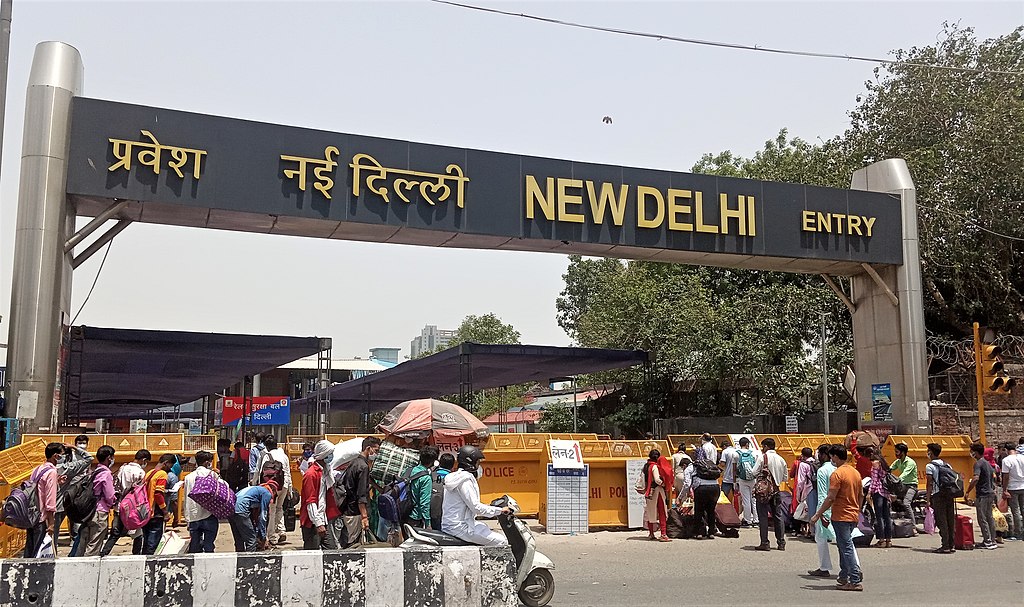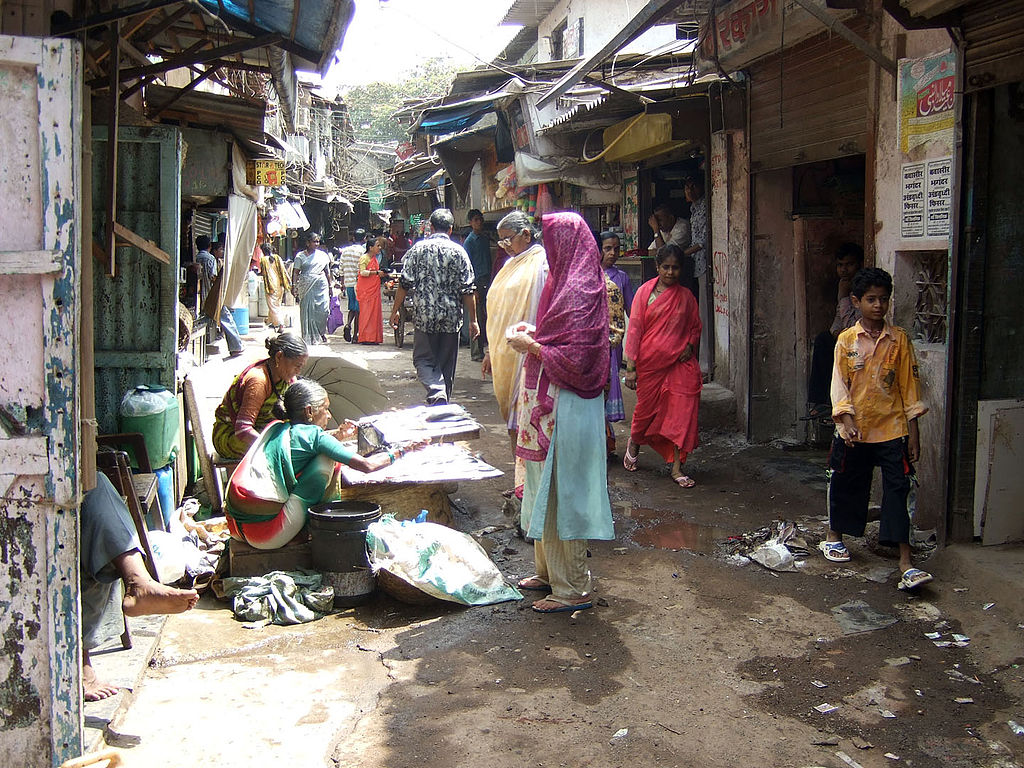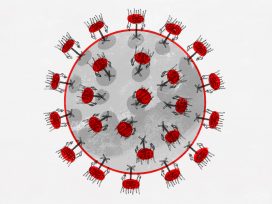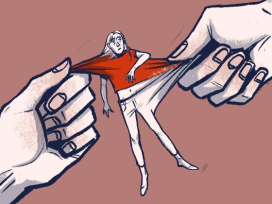Pandemic rape in India
The corona crisis, informal gendered support and vulnerable migrant women
Staying home may reduce COVID-19 infection but is not the safest place for all – women with violent partners are more at risk of abuse during lockdown. And solidarity is crucial. Atreyee Sen addresses the critical situation in India, where women are also being attacked in institutions and when forced to migrate.
While lockdowns and quarantines are essential to suppressing the global spread of COVID-19, they are trapping vulnerable women with abusive partners. The United Nations Secretary, General António Guterres, citing a ‘horrifying surge in domestic violence’ amid global coronavirus lockdowns, called on governments to address this issue as a key part of their coordinated response to the pandemic.1 And indeed, countries most affected by the corona lockdown, such as France, have witnessed an exponential rise in sexual attacks against women, Paris seeing a 36 per cent rise in violent domestic abuse cases in just one week.2 Guterres poignantly stated that ‘violence is not confined to the battlefield’. Staying at home is currently advocated as a primary source of personal and community safety. Yet for many women and young girls compelled to remain within the confines of their households, the threat of sexual violence clashes with these safety discourses against spreading contagion. At a time of social isolation, when women have no mobility beyond their homes, Guterres appealed ‘for peace at home – and in homes – around the world’.3
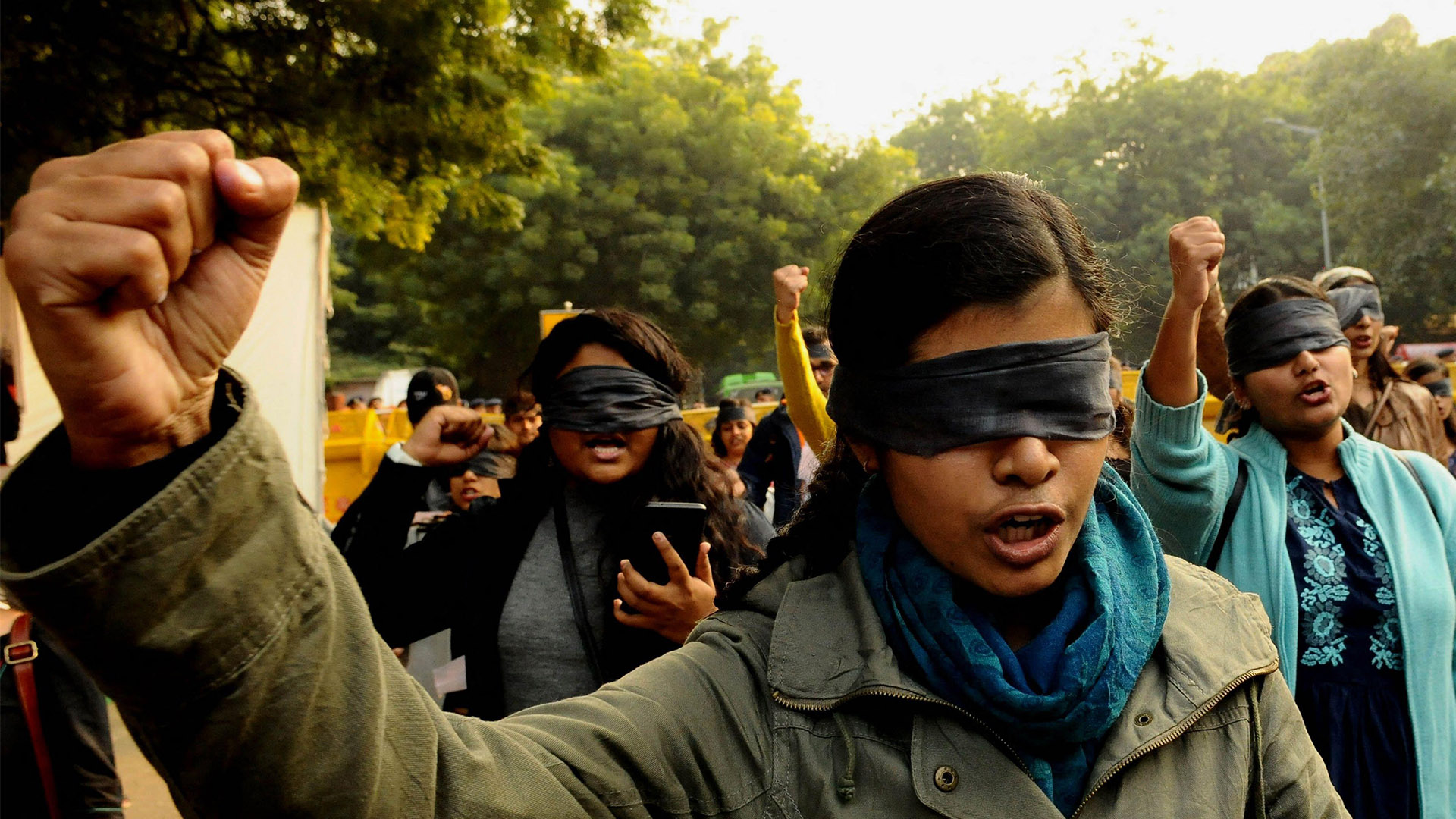
Women’s rights activists rehearse before taking part in a performance during a protest to denounce femicide and violence against women, in New Delhi, India, 07 December 2019.
Photo by Anshuman Akash/ ABACAPRESS / Alamy Stock Photo
In India, according to the National Crime Records Bureau, one woman gets raped every twenty minutes, and the onset of the corona crisis has precipitated an exponential rise in marital rape, domestic violence and sexual assault on both upper and lower class women.4 While writing this text (in May 2020) the region is under total lockdown, with around 1.3 billion people ordered to stay home. For the purpose of this essay, I want to offer insights into the particular vulnerabilities of women from poor families in tight-knit slums for migrant labourers in urban India. Most of these women migrants work as street vendors, construction workers, cooks, cleaners and housemaids in the city. Many of them currently experience different types and levels of sexual and domestic abuse, ranging from psychological torture to violent penetrative sex. From this spectrum, I will refer to specific case studies in which women were raped, that is where there was non-consensual, forced sex, within and outside the remit of domesticity, which could have been preceded or followed by physical assault. I want to illustrate how rural women migrants are stuck in various conditions of (what I describe as) ‘lockdown violence’, that is they are either restricted to undersized urban housing with abusive husbands or suffer sexual attacks while returning to be quarantined in their village homes.
Also, historically, war, crisis and disasters have generated and sustained varieties of women’s care networks. In this essay I will reflect further on how women experiencing lockdown violence encounter comfort in gendered acts of support displayed by female migrant workers. By highlighting the specific sexual vulnerabilities generated by the corona pandemic in India, I want to develop an analytical space that underlines the ways in which micro-level expressions of poor women’s affective networks respond to this particular crisis.
My reflections are based on two decades of conducting extensive ethnographic fieldwork among female casual workers in Kolkata and Mumbai,5 two prominent Indian cities which have a long history of rural-urban labour migration. The stories of violated women described below have been collected through phone conversations, but I have long-established relationships of trust with my interlocuters. While anthropologists tend to think critically of long-distance interviews – conducted via phone or video call – these communications platforms can also offer a host of perspectives when research necessarily becomes distant and remote.

This article was originally published in the Austrian feminist history journal ‘L’Homme’. Their 2/2020 issue deals with the realm of the senses. Read our review here.
Human exodus and the corona crisis in India
India’s continuing nationwide lockdown6 has created a severe dislocation in the lives of its 453 million internal migrant population. Journalists across the world have labelled this period ‘a great human tragedy’.7 Even though the outbreak has been alarming, it has not yet reached critical proportions, with a small number of reported deaths (4,000 deaths in May 2020). Many reports have found these statistics misleading, since the test-rate in India is among the lowest in the world.8 The central and state governments anticipate that the actual number of cases this year will have a crippling impact on the country’s public health system.
Despite the government’s announcement of giant stimulus packages which would offer small funds and basic amenities to the poor, the lockdown has precipitated a severe crisis for India’s migrant workers.For example, with the absence of any public transportation and a lockdown on manual labour economies, millions of migrants are compelled to trek for hundreds or even thousands of kilometres to return to their native rural homes.9 If they make it to their villages, they often live in quarantine on the outskirts, seeking shelter in tree branches and makeshift tents to protect their relatives.10 This trek has already led to the deaths of a number of migrants along the way.
The absence of wages, food and medication in urban centres has also brought penury and starvation to migrants who have remained in the city. Slum-dwellers are regularly edged out of their living quarters if a corona infection is identified in these marginalised housing areas. There are reports of health officials using hosepipes to douse migrant labourers in informal settlements with disinfectant, since the population density of slum areas makes it tough for residents to maintain social distance.11 Many workers who had decided to stay back eventually escaped the city to put an end to this protracted humiliation of the urban poor, who find themselves in a state of ‘chronic crisis’.12 Thus, the corona lockdown in India has triggered the world’s largest human exodus.
Women’s vulnerability and informal support
According to help lines that respond to women in domestic distress, the number of calls after the lockdown (which started after Prime Minister Narendra Modi’s speech on 24 March 2020) has increased by 50 per cent.13 Without the usual surveillance of police patrols and child protection units, which have now been mobilised to enforce social distancing, there has been an exceptional rise in domestic abuse. This not only affected the physical and emotional health of women; witnessing regular domestic abuse has also provoked large numbers of children to run away from their homes.
I will offer a few cases of marital and stranger rape against urban migrant women (who either remained in the city or returned to their villages), and show how other migrant women attempted to stage small-scale interventions to alleviate their pain. My first example comes from Sudha, one of my long-term interlocuters in a slum in Mumbai, who decided to remain in the city with a few other women in her locality. She wanted to take her chances with acquiring intermittent work. While talking on the phone, I discovered that she was concerned about her neighbour. Priti, who has been popular in the neighbourhood as a kind and young bride, is being aggressively beaten and raped by her husband every night. Many slum women, who are caught in phases of conjugal violence, get respite when their husbands are away working long hours as low-paid labourers. Even when they return home in a foul mood, they are often drunk or tired, and drop off to sleep. The external worklife of migrant men usually gives the women and children reprieve from facing the anger of violent husbands and fathers. Even when their husbands would go through periods of unemployment and stayed at home, the women could leave for work or socialising, which gave them a chance to avert domestic tensions. However, being stuck at home during a pandemic has disrupted these cycles of encountering and escaping domestic violence. ‘The repeated bouts of violent sexual intercourse are making Priti semi-paralysed’, said Sudha.
Sudha, along with the other remaining women in the slum, quickly devised a plan which would interrupt marital rape. And yet, it would not violate rules of social distancing. Whenever Sudha hears Priti cry while being attacked, Sudha bangs pots and pans together. This form of noise-making (now made popular as a form of applause for healthcare workers) prompts other women in the slum to also start beating their vessels in protest, making the abusive husband understand that this cacophony is raised because he hurts his wife. It is show of gendered solidarity for Priti. ‘After facing repeated loud disruptions to his assaults, he has learnt to control himself, perhaps temporarily’, muses Sudha. This ‘sound of solidarity’ was comforting for Priti, knowing that the women were out there in her support, even as she could not step out of the house to hug and thank the women in her neighbourhood.
In another conversation with Radha, a female migrant worker in Kolkata, I uncovered more stories of sexual assault against women who decided to leave the city. The massive human exodus related to the corona crisis made travelling migrant women particularly vulnerable. They usually walk unescorted for miles through treacherous terrains, without the speed and relative safety of trains and buses. While Radha trekked to her rural home with her family, she found a woman she knew well, raped and ditched by the wayside. Urging her family to carry on without her, Radha stayed by the side of the woman encouraging her to get up and walk until she returned home. ‘In any other situation, I would have touched her and helped her up on her feet’, she said. ‘But I couldn’t for the fear of contagion. Even if she was healthy in the past, she could have been infected by her rapist. I didn’t leave her though. I kept talking to her from a distance until she was done crying and finally rose to her feet. Then we walked back to the main road together. She was limping but she had to walk on.’ After reaching her village, Radha called her friend. Not just to ensure that her friend had reached her village safely, but Radha also convinced her friend’s family to remain sympathetic to her migration ordeal.
Many women who have been through such harrowing experiences are afraid to approach the police, who are already under-resourced and stretched due to the corona crackdown. According to Rekha Sharma, who leads the National Commission for Women in India, ‘women are not approaching the police because they think that if they take their husband away, her in-laws will then torture her. And he will, in turn, torture her more when he gets out of the police station. Earlier, women could go to their parents but now they are unable to reach them’.14 Several of the semi-literate women I conduct research work with are fearful of the police (who often oppress the urban poor), and are unfamiliar with government help lines and NGO services. They continue to rely on informal support from women in their migration environment. They reach out to friends, kin networks, schoolteachers and other known female affiliates in order to find pathways to contest their current predicament. In addition, many other women household workers I spoke with escaped their potentially violent domestic situations by entering into lockdown with their sympathetic, affluent and female employers. By offering to stay in isolation with them, the women cooks, cleaners and care workers managed to steer clear of frustrated, unemployed migrant husbands at home, and still retain an income in the city.
Gendered crisis improvisations
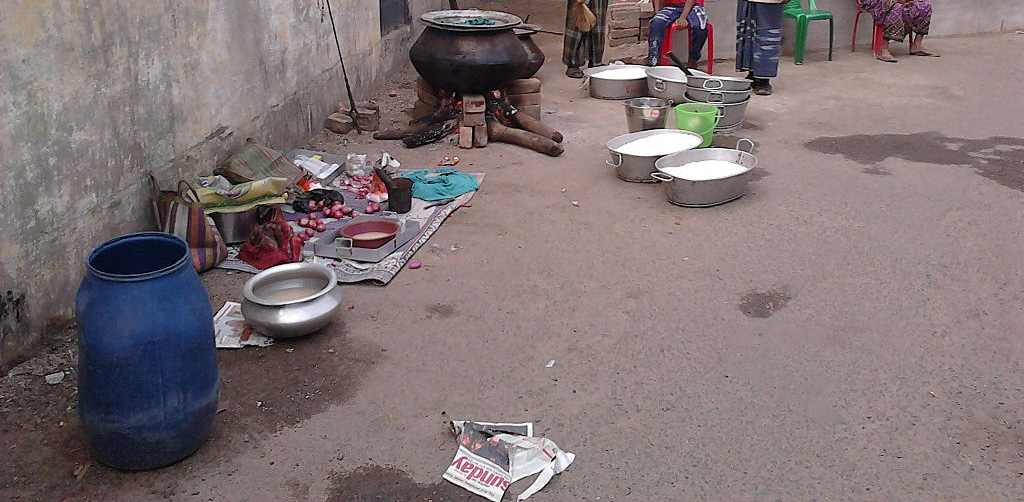
Pakki Biryani cooking on the Bangal Para 2nd bye lane, Howrah,India, for a mass feeding. Photo by Biswarup Ganguly, CC BY 3.0 via Wikimedia Commons
The United Nations Women Executive Director Phumzile Mlambo-Ngcuka said that the violence against women and girls is a ‘shadow pandemic’,15 in which confinement is fostering domestic clashes generated by insecurity, poor health and financial worries. In India, the corona crisis has created a specific range of ‘lockdown violence’ against women. In a prominent case in northern India, for example, a woman infected with corona and recovering in an isolation ward was raped and killed by doctors.16
A number of high-level women’s organisations are coming forward as international pressure groups across the world and influencing governments to approach the pandemic with feminist policies and concerns for gendered human rights. However, implementing these pro-women policies during a global pandemic is a slow process, and it remains to be seen whether they reach women at the lowest rung of society.
With that in mind, this commentary has highlighted the importance and vitality of pre-existing, more small-scale gendered solidarities that are also improvising and generating more immediate and mundane strategies to support violated women against the backdrop of the corona crisis. While the pandemic is increasingly isolating women with violent partners and separating them from the people and resources that offer them any assistance, the crisis is also producing fragmented forms of gendered care practices. These ‘on-the-ground’ practices are directed towards assuaging the vulnerable lives of Indian migrant women, without necessarily rupturing the need for isolation and distancing at this critical moment in the medical history of the world.
Cf. Coronavirus lockdown: UN chief urges end to domestic violence, citing global surge, in: Associated Press, 6 April 2020, last accessed 20 April 2020.
Cf. Domestic violence cases jump 30% during lockdown in France, in: Euronews, 28 March 2020, last accessed 20 April 2020.
Coronavirus lockdown, see note 2.
Cf. Ruchika Tulshyan, Rape Every 20 Minutes For The World’s Largest Democracy?, in: Forbes Woman, 2 January 2013, last accessed 20 April 2020.
For further research see, for example, Atreyee Sen, Shiv Sena Women: Violence and Communalism in a Bombay Slum, London 2007. And for other previous contributions with a focus on ’the history of sexual violence and its global dimensions’ cf. Gaby Zipfel, Sexuelle Gewalt − eine Einführung, in: L’Homme. Z. F. G. , 27, 1 (2016), 119−127; Alexandra Oberländer, Zur Politisierung sexueller Gewalt. Der Fall Marija Spiridonova im revolutionären Russland 1906, in: L’Homme. Z. F. G., 27, 2 (2016), 133−142; Hyunah Yang, Justice Yet to Come: the Korea-Japan Foreign Ministers’ Agreement of 2015 Regarding the ‘Japanese Military Sexual Slavery’, in: L’Homme. Z. F. G., 28, 2 (2017), 115−125; Birgitt Haller, Sexuelle Belästigung von Lehrlingen und jungen ArbeitnehmerInnen, in: L’Homme. Z. F. G., 29, 1 (2018), 127−131; Maria Rösslhumer, “Home Sweet Home”? 40 Jahre Frauenhausbewegung in Österreich, in: L’Homme. Z. F. G., 29, 2 (2018), 135−143; Hafdís Erla Hafsteinsdóttir, “She frequently visits taverns.” Surveillance, Panic and Institutionalised Violence against Women in Iceland during the Second World War, in: L’Homme. Z. F. G., 30, 1 (2019), 133−140; Birgit Sauer, #MeToo. Ambivalenzen und Widersprüche affektiver Mobilisierung gegen sexuelle Gewalt, in L’Homme. Z. F. G. 30, 2 (2019), 93−110; Regina Mühlhauser, Sexuelle Gewalt als Kriegswaffe. Zur Entwicklung eines Verständnisses seit den 1970er-Jahren, in: L’Homme Z. F. G. 31, 1 (2020), 129−138.
India is now in its seventh stage of unlock/lockdown cycle, which started in March 2020.
Soutik Biswas, Coronavirus: India’s pandemic lockdown turns into a human tragedy, in: BBC News, 30 March 2020, last accessed 20 April 2020.
Cf. Alexandra Ulmer, Odd number in India coronavirus testing data sparks questions, in: The Jakarta Post, 6 April 2020, last accessed 20 April 2020.
Cf. Sandeep Datta, India: Migrant workers’ plight prompts UN call for ‘domestic solidarity’ in coronavirus battle, in: UN News, 2 April 2020, last accessed 20 April 2020.
Cf. Peter Stubley, Coronavirus: Indians self-isolate in trees to protect relatives, in: The Independent, 30 March 2020, last accessed 20 April 2020.
Cf. Alasdair Pal, Outrage in India as migrants sprayed with disinfectant to fight coronavirus, in: Reuters, 30 March 2020, last accessed 20 April 2020.
Henrik Vigh, Crisis and Chronicity: Anthropological Perspectives on Continuous Conflict and Decline, Ethnos Vol. 73, No. 1, 2008, 5–24.
Coronavirus lockdown. Govt. helpline receives 92,000 calls on child abuse and violence in 11 days, in: Press Trust of India, 8 April 2020, last accessed 20 April 2020.
Coronavirus lockdown, see note 13.
Violence against women and girls: the shadow pandemic, Statement by Phumzile Mlambo-Ngcuka, Executive Director of UN Women, in: UN Women, 6 April 2020, last accessed 20 April 2020.
Cf. Gaya, Bihar/Doctor rapes woman in Corona isolation ward, woman dies, attempts to suppress incident, investigation begins, in: The State, 8 April 2020, last accessed 20 April 2020.
Published 7 December 2020
Original in English
First published by V&R unipress, 10/2020
Contributed by L'Homme © Atreyee Sen / V&R unipress / L'Homme / Eurozine
PDF/PRINTPublished in
In focal points
Newsletter
Subscribe to know what’s worth thinking about.
Related Articles

Prisoners of conscience
A conversation with Myroslav Marynovych
Defenders of human rights often face high stakes. When the Ukrainian Helsinki Group openly challenged the Soviet Union in the name of the 1975 Universal Declaration of Human Rights, young dissidents soon became political prisoners. The price for being a non-conformist was steep yet encouraged solidarity, paving the way to Euromaidan.

Unmasking naked delusion
Tangent
Ever been had? Led to believe a lie, an untruth? Realized the con too late? It can happen to anyone. Deception is rife. But so too is delusion. ‘Tangents’, a new Eurozine editorial feature, takes a critical look at the duplicitous pair.
